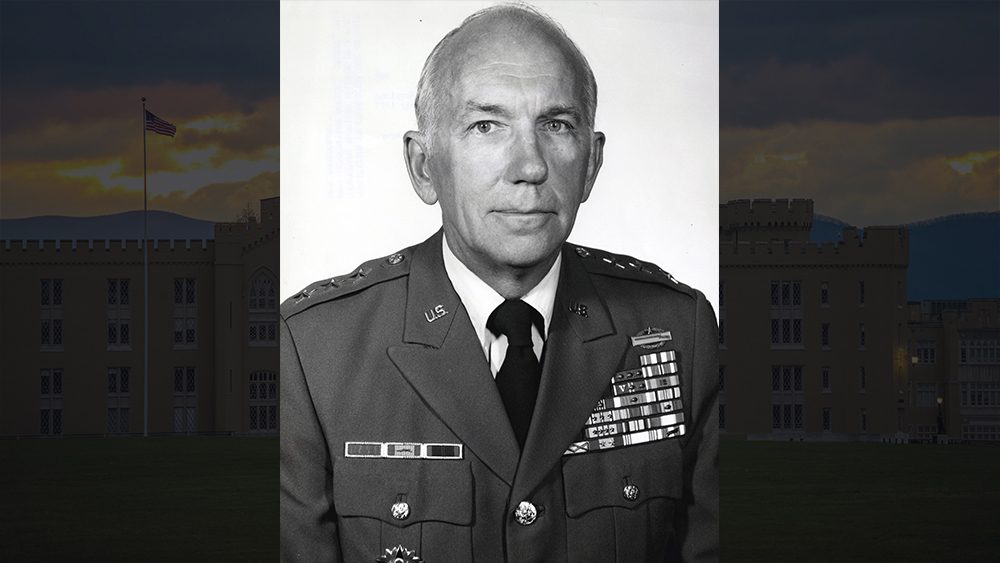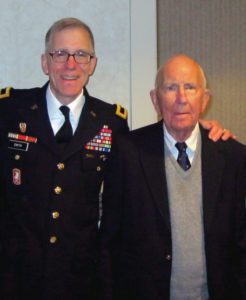In Memory: Lt. Gen. Jeffrey G. Smith ’43

Retired U.S. Army Lt. Gen. Jeffrey G. Smith ’43, former commandant of cadets and father of a former dean of the faculty, died March 21, 2021.

Retired U.S. Army Lt. Gen. Jeffrey G. Smith ’43, former commandant of cadets and father of a former dean of the faculty, died March 21, 2021.
Retired U.S. Army Lt. Gen. Jeffrey G. Smith ’43, former commandant of cadets and father of a former dean of the faculty, died March 21, 2021. He was 99.
The son of an Army colonel and the descendant of soldiers who served in the American Revolution, the Civil War, and World War I, Smith was born at Fort Sam Houston, Texas, in October 1921. As a cadet, he excelled academically, wearing academic stars throughout his cadetship. At graduation, he received VMI’s top academic honor, the Jackson-Hope Medal, First Honor, in civil engineering. He did well within both the Institute’s regimental system—becoming a corporal, first sergeant, and captain commanding Company C—and in the ROTC program, receiving the Sons of the American Revolution Medal as an outstanding cadet. A keen equestrian—Company C was the Corps’ cavalry company—Smith was a member of the Institute’s horse show team and received the Col. Harry N. Cootes Trophy as the outstanding cavalry cadet. He also was the president of the Hop Committee in his 1st Class year.
After graduation from VMI, he attended the Army’s Officer Candidate School and received his commission as a second lieutenant in January 1944. After receiving his commission, Smith joined the 124th Cavalry Regiment, which then was the only cavalry regiment to retain horses. The regiment soon moved to Fort Riley, Kansas; transformed into a mechanized unit, and deployed to the Far East, arriving in India in August 1944. As the unit fought against the Japanese in northern Burma, near the famous Burma Road, Smith served as a troop commander and a squadron operations officer. At the end of the war, the regiment was deactivated, and Smith joined an American team (headed by then-Maj. Richard M. Irby, Class of 1939, who would later serve as superintendent), which observed the surrender of a Japanese army to Chinese forces in northern China. He then helped expedite the embarkation of Chinese forces from Hanoi and Haiphong in what was then French Indochina.
Returning to the United States in summer 1946, Smith received a regular commission and then spent the next two years earning a Master of Science degree in mechanical engineering from Johns Hopkins University. He would later receive another Master of Science degree from George Washington University. Over the next eight years, he held numerous staff positions and attended the Infantry School Advanced Course and the Command and General Staff College.
He took command of an armored infantry battalion at Fort Knox, Kentucky, in the middle of 1957, serving in that role until 1959 when he became a student at the Armed Forces Staff College in Norfolk, Virginia. Assignments in Korea came after his graduation from that institution, followed by his assignment to VMI as the commandant of cadets and professor of military science in summer 1960.
According to Smith’s son, Jeffrey G. Smith, Jr. ’79, Ph.D., Smith immediately developed a close relationship with the newly arrived superintendent, retired U.S. Marine Corps Brig. Gen. George R.E. Shell, Class of 1931, based on their mutual determination to strictly enforce cadet regulations and to improve the Corps’ discipline and appearance. “In short order, [they] would enforce the rule that barred cadets from getting married; assigned barracks rooms for rats and 3rds by company; and restored the use of cuffs and cuff links in the wearing of the formal blouse.”
These and other actions by Shell and Smith chafed many cadets. Things came to head in March 1961, according to Smith ’79, when Shell changed the time cadets would return from spring furlough. “The 1st Class decided enough was enough and ‘stepped off.’” In response, Smith “ordered the first captain, Lee Badgett ’61, to form up the 1st Class and double-time it twice around the Parade Ground.” Smith ’79, then six years old, witnessed the event from the front porch of the Commandant’s Quarters. In response the following day, the Class of 1961 declared an end to the Class of 1964’s Rat Line. Shell took the opportunity to make a shortened Rat Line a permanent part of VMI culture.

Retired U.S. Army Lt. Gen. Jeffrey G. Smith ’43, former commandant of cadets (right), with his son, retired U.S. Army Brig. Gen. Jeffrey G. Smith Jr. ’79, former dean of the faculty.
After Smith’s tour at VMI ended in 1963, he attended the National War College and then served on the staff of the Seventh Army in Germany. Remaining in Germany, he went on to command the 2nd Brigade, 3rd Armored Division for two years. In 1968, he became the deputy commander of the 199th Light Infantry Brigade in Vietnam and took command in December 1968.
In January 1969, Smith was wounded when he was hit by ground fire as his command-and-control helicopter flew at low altitude to cover the rescue of a downed helicopter pilot. He received the Distinguished Flying Cross, the Silver Star, and the Purple Heart for this action.
After further service in Vietnam, he returned to Korea in November 1969 for duty with the Eighth Army. In October 1971, Smith—by then a brigadier general—took command of the Korea-based 2nd Infantry Division. A year after becoming a major general in July 1972, he returned to the United States for staff duty at the U.S. Army Forces Command. Promoted to lieutenant general in August 1975, Smith took on his final assignment—commander of the First United States Army at Fort George G. Meade—and retired in late September 1979. One of his final actions on active duty was to act as the Army commissioning officer for the Class of 1979 and then swear in his son as an officer.
After his retirement from the Army, Smith joined the Ethyl (now NewMarket) Corporation. For 17 years, he served as the firm’s director of government affairs and later as a corporate vice president, working for his brother rat, Floyd “Bill” Gottwald Jr. ’43.
A steadfastly loyal alumnus, Smith served as an informal adviser to numerous superintendents. He also, according to his son, “noted with pride, pleasure, and some amusement his opportunity to have served in some close developmental capacity for two future superintendents (J.H. Binford Peay III ’62 and Josiah Bunting III ’63) and three deans (James M. Morgan Jr. ’45; Lee Badgett ’61; and of course, me).” His son also related that Smith was able to recall the names of cadets during his cadetship and his tour as commandant. “Whenever a former cadet came up in conversation, my father would provide a key detail from their long-ago interaction, always in the context of their relative youth and with affection.”
Smith also helped with the development of a book about the days of horses on post, Keydet Grey and Garry Owen: The Horse at VMI. A photograph of him as the commander of Company C graced the book’s cover.
Smith served his brother rats as their class agent from 2007-18. In that capacity, he launched what his son described as “the last major project of his life: The Class of 1943’s 70th Reunion.” The project’s highlight was when, after leading his nine brother rats into Old Barracks, Smith climbed the sentinel box and led an Old Yell for his class.
His American awards include the Army Distinguished Service Medal, the Silver Star, four awards of the Legion of Merit, the Distinguished Flying Cross, the Bronze Star with “V” device and two oak leaf clusters, 13 awards of the Air Medal, and two awards of the Purple Heart. He also received service and gallantry awards from the Republic of China, the Republic of Korea, and the Republic of Vietnam.
Smith’s wife, Jane Holland Smith, and a grandson predeceased him. He is survived by six children, including retired U.S. Army Brig. Gen. Jeffrey G. Smith Jr. ’79, former deputy superintendent for academics and dean of the faculty; 15 grandchildren; and two great-grandchildren.

The communications officer supports the strategy for all communications, including web content, public relations messages and collateral pieces in order to articulate and promote the mission of the VMI Alumni Agencies and promote philanthropy among varied constituencies.